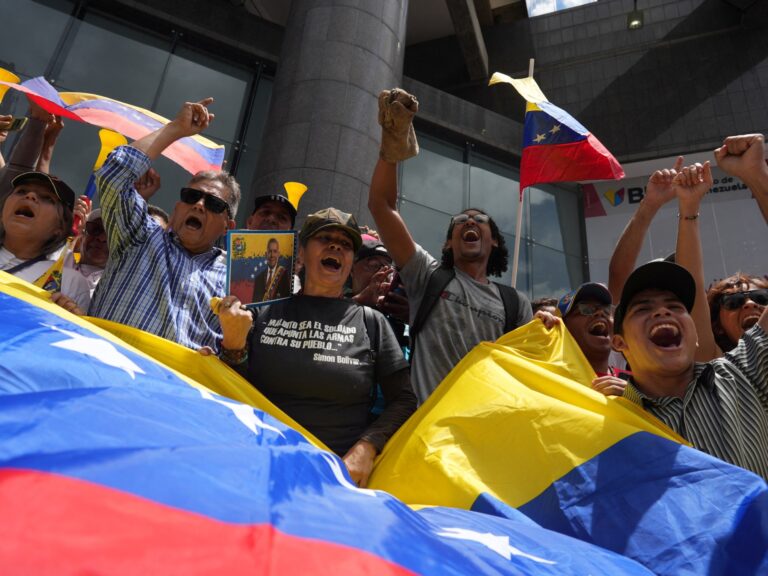Protests have once again taken to the streets in Venezuela as opposition leaders challenge the results of a weekend election that secured President Nicolas Maduro another term in office.
Opposition leader Maria Corina Machado called on families to take part in “people’s rallies” to be held across South America on Tuesday.
Machado told reporters the previous day that an examination of the voting records from Sunday’s presidential election showed that opposition candidate Edmundo Gonzalez had won a “decisive and mathematically irreversible” victory over Maduro.
“There are millions of Venezuelans who want their vote to count,” Machado also wrote on social media.
Opposition demonstrators marched throughout the day in the capital Caracas, as well as in the cities of Valencia, Maracay, San Cristobal, Maracaibo and Barquisimeto.
The protests came a day after Venezuela’s National Electoral Commission (CNE) formally certified that President Maduro had been re-elected by a majority of Venezuelans for a six-year presidential term “from 2025 to 2031.”
The announcement sparked widespread outrage and thousands of Venezuelans took to the streets in several districts in Caracas and elsewhere to voice their opposition to President Maduro and his government.
During Monday’s demonstrations, protesters chanted “Freedom, freedom!” and “This government will fall!” as police fired tear gas and rubber bullets.
A local monitoring group, the Venezuelan Observatory for the Conflict, said 187 protests had been recorded in 20 states by Monday night, with “numerous acts of repression and violence” carried out by paramilitary and security forces.
At least six people were killed across the country in incidents related to the election count and protests, according to human rights group Foro Penal.
Meanwhile, Venezuela’s opposition party Voluntad Popular announced in a social media post on Tuesday that its national coordinator, Freddy Sperlano, had been detained.
Opposition presidential candidate Gonzalez called on the country’s security forces to “respect the will” expressed in Sunday’s vote and “stop repressing peaceful demonstrations.”
“We, the Venezuelan people, want peace and respect for the will of our people,” he wrote on social media on Tuesday.
Maduro denies the criticism
Maduro rejected international criticism and doubts about the results of Sunday’s vote, saying without evidence that Venezuela had been the target of an attempted “coup” of a “fascistic and anti-revolutionary” nature.
The Maduro government has also called the protesters violent instigators. “We have seen films like this before,” Maduro said at the presidential palace, promising that security forces would keep the peace.
“We have been following all the acts of violence instigated by the far right,” said the Venezuelan leader, who first came to power in 2013 after the death of his predecessor, Hugo Chavez.
Maduro’s campaign manager, Jorge Rodriguez, called for “massive demonstrations starting this Tuesday to celebrate this victory.”
Meanwhile, Venezuela’s Defense Minister Vladimir Padrino said Maduro has the “absolute loyalty and unconditional support” of the military. In a televised message, he called Maduro “our commander in chief, legitimately re-elected.”

Attorney-General Tarek William Saab told reporters that 749 people had been arrested in the protests so far, adding that most would be charged with “resisting authority and, in the most serious cases, terrorism”.
Renata Segura, Latin America and the Caribbean program director at the International Crisis Group, told Al Jazeera there were concerns about a possible crackdown on widespread protests.
“Things could get very messy as pressure continues to grow on President Maduro and countries in Latin America and beyond refuse to recognise his election victory unless they can show proof there was no fraud,” Segura said.
“It can get violent very quickly.”
The UN High Commissioner for Human Rights, Volker Turk, also expressed concern about “the disproportionate use of force by law enforcement officials and reports of violence by pro-government armed groups (colectivos).”
“Those responsible for human rights violations must be held accountable,” Turkey’s foreign minister said in a statement, adding that Venezuela was at a “critical crossroads.”
“We call on the authorities to respect the right of all Venezuelans to peacefully assemble, protest and freely express their opinions without fear,” he said.
International response
The result has drawn mixed reactions from foreign governments, with the United States, the European Union and several Latin American countries calling for a “transparent” process, while Venezuela’s allies, including China, Russia and Cuba, congratulated President Maduro.
Kremlin spokesman Dmitry Peskov said Tuesday that Venezuela’s opposition must accept defeat and warned against outside interference.
The Washington-based Organization of American States (OAS) election monitoring section said on Tuesday morning that it could not certify the results. The OAS is scheduled to hold an emergency meeting on Wednesday to discuss the election.
The group’s report said the events on election night confirmed “a coordinated strategy unfolding over the past several months to undermine the integrity of the electoral process.”
This follows Peru’s decision to say it was suspending ties with both Venezuela and Panama over the disputed vote and to recall their ambassadors.
Caracas hit back, announcing it would withdraw its diplomats from Argentina, Chile, Costa Rica, Panama, Peru, the Dominican Republic and Uruguay, and halting flights between Panama and the Dominican Republic.
Ongoing political unrest has raised concerns about the possibility of a crackdown on peaceful protests and a new wave of migration from Venezuela.
The country has experienced an economic collapse in recent years, forcing millions of people to flee the country.

